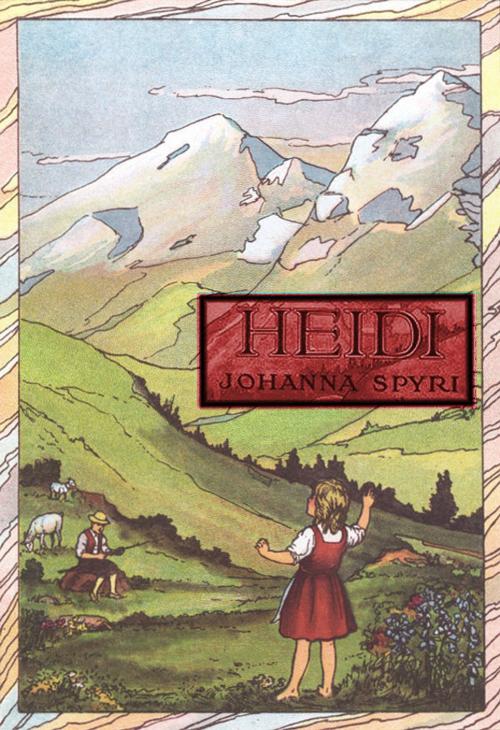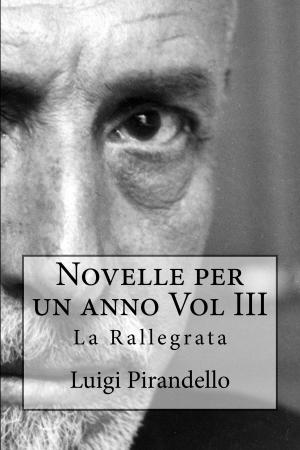Heidi Illustrated
For children and those who love children
Kids, Fiction, Classics, Teen, General Fiction, Fiction - YA| Author: | Johanna Spyri, Mabel Abbott | ISBN: | 1230000272392 |
| Publisher: | Mauro Liistro Editore | Publication: | October 5, 2014 |
| Imprint: | Mauro Liistro Editore | Language: | English |
| Author: | Johanna Spyri, Mabel Abbott |
| ISBN: | 1230000272392 |
| Publisher: | Mauro Liistro Editore |
| Publication: | October 5, 2014 |
| Imprint: | Mauro Liistro Editore |
| Language: | English |
Adelheid ("Heidi") is a girl who has been raised by her aunt Dete in Maienfeld, Switzerland after the early deaths of her parents, Tobias and Adelheid (Dete's sister and brother-in-law). Dete brings 5-year-old Heidi to her grandfather (her father's father), who has been at odds with the villagers and embittered against God for years and lives in seclusion on the alm. This has earned him the nickname Alp-Öhi ("Alm-Uncle" in the Graubünden dialect). Alm-Uncle briefly resents Heidi's arrival, but the girl's evident intelligence and cheerful yet unaffected demeanor soon earn his genuine, if reserved, affection. Heidi enthusiastically befriends her new neighbors, young Peter the goatherd and his mother and blind grandmother. With each season that passes, the mountaintop inhabitants grow more attached to Heidi.
Three years later, Dete returns to bring Heidi to Frankfurt am Main to be a hired companion to a wealthy girl named Klara Sesemann, who is regarded as an invalid. Klara is charmed by Heidi's simple friendliness and naïveté, and delights in all the funny mishaps brought about by Heidi's lack of experience with city life. However, the Sesemanns' strict housekeeper, Fräulein Rottenmeier, views the household disruptions as wanton misbehavior, and places Heidi under more and more restraint. Soon Heidi is terribly homesick, and grows alarmingly pale and thin. Her one diversion is learning to read and write, motivated by her desire to go home and read to Peter's blind grandmother. Klara's own grandmother visits the children and becomes a friend to Heidi. She teaches Heidi that she can always seek relief from misery by praying to God.
After months pass, the Frankfurt household is brought near hysteria by night sightings of what appears to be a ghost. When Klara's father and his friend, Klara's doctor, keep awake one night to find out what is causing the disturbances, they see that the "ghost" is actually Heidi, sleepwalking in her nightgown. The doctor sees that Heidi is under a great deal of stress. He cautions Klara's father that if Heidi is not sent home promptly, she may become very ill. Soon, a joyous Heidi returns to the mountains, where she teaches Alm-Uncle about the comfort of prayer. She reassures him that it is never too late to turn back to God. Her simple lesson prompts her grandfather to descend to the village and attend a church service for the first time in years, marking an end to his seclusion. He is heartily welcomed back by the church pastor and the villagers.
Heidi and Klara continue to keep in touch and exchange letters. A visit by the doctor to Heidi leads him to eagerly recommend that Klara visit Heidi. He feels assured that the fresh mountain air and the wholesome companionship will do her good. Klara makes the journey the next season and spends a wonderful summer with Heidi. Klara becomes stronger on goat's milk and fresh mountain air, but Peter, who grows jealous of Heidi and Klara's friendship, pushes Klara's wheelchair down the mountain to its destruction (although he later feels guilty about what he did and confesses to it). Without her wheelchair, Klara attempts to walk and is gradually successful. Klara's grandmother and father are amazed and overcome with joy to see Klara walking. Klara's wealthy family promises to provide care for Heidi, if there comes a time when her grandfather's no longer able to do so.
Adelheid ("Heidi") is a girl who has been raised by her aunt Dete in Maienfeld, Switzerland after the early deaths of her parents, Tobias and Adelheid (Dete's sister and brother-in-law). Dete brings 5-year-old Heidi to her grandfather (her father's father), who has been at odds with the villagers and embittered against God for years and lives in seclusion on the alm. This has earned him the nickname Alp-Öhi ("Alm-Uncle" in the Graubünden dialect). Alm-Uncle briefly resents Heidi's arrival, but the girl's evident intelligence and cheerful yet unaffected demeanor soon earn his genuine, if reserved, affection. Heidi enthusiastically befriends her new neighbors, young Peter the goatherd and his mother and blind grandmother. With each season that passes, the mountaintop inhabitants grow more attached to Heidi.
Three years later, Dete returns to bring Heidi to Frankfurt am Main to be a hired companion to a wealthy girl named Klara Sesemann, who is regarded as an invalid. Klara is charmed by Heidi's simple friendliness and naïveté, and delights in all the funny mishaps brought about by Heidi's lack of experience with city life. However, the Sesemanns' strict housekeeper, Fräulein Rottenmeier, views the household disruptions as wanton misbehavior, and places Heidi under more and more restraint. Soon Heidi is terribly homesick, and grows alarmingly pale and thin. Her one diversion is learning to read and write, motivated by her desire to go home and read to Peter's blind grandmother. Klara's own grandmother visits the children and becomes a friend to Heidi. She teaches Heidi that she can always seek relief from misery by praying to God.
After months pass, the Frankfurt household is brought near hysteria by night sightings of what appears to be a ghost. When Klara's father and his friend, Klara's doctor, keep awake one night to find out what is causing the disturbances, they see that the "ghost" is actually Heidi, sleepwalking in her nightgown. The doctor sees that Heidi is under a great deal of stress. He cautions Klara's father that if Heidi is not sent home promptly, she may become very ill. Soon, a joyous Heidi returns to the mountains, where she teaches Alm-Uncle about the comfort of prayer. She reassures him that it is never too late to turn back to God. Her simple lesson prompts her grandfather to descend to the village and attend a church service for the first time in years, marking an end to his seclusion. He is heartily welcomed back by the church pastor and the villagers.
Heidi and Klara continue to keep in touch and exchange letters. A visit by the doctor to Heidi leads him to eagerly recommend that Klara visit Heidi. He feels assured that the fresh mountain air and the wholesome companionship will do her good. Klara makes the journey the next season and spends a wonderful summer with Heidi. Klara becomes stronger on goat's milk and fresh mountain air, but Peter, who grows jealous of Heidi and Klara's friendship, pushes Klara's wheelchair down the mountain to its destruction (although he later feels guilty about what he did and confesses to it). Without her wheelchair, Klara attempts to walk and is gradually successful. Klara's grandmother and father are amazed and overcome with joy to see Klara walking. Klara's wealthy family promises to provide care for Heidi, if there comes a time when her grandfather's no longer able to do so.















